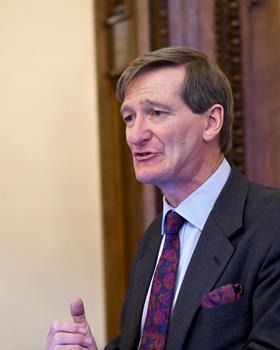A growing perception that corruption is possible in British public life is emerging as a threat to the rule of law, the former attorney general Dominic Grieve QC MP said today. Speaking in Chancery Lane as part of the Law Society's rule of law lecture series, Grieve recalled his concern at the 2010 conviction of a crown prosecutor who had come under pressure from members of the same community 'from a background outside Europe, where corruption was endemic' to drop a prosecution.
'This is a subject we are tending to brush under the carpet,' he said. 'It is not confined to immigrant groups. Once the idea gets around it is going to spread everywhere. We are looking at a situation where we are gradually returning to 18th century practices.'

The perception that corruption exists in the enforcement of planning laws is creating a particular threat to the key concepts of certainty and predictability, Grieve said. Budget restrictions had forced authorities to 'pick and choose' where they carried out enforcement actions - 'of course that is going to lead to the appearance of bias in the system'.
Corruption was only one of a series of 'nightmare visions' of potential threats to the rule of law, headed by access to justice.
'We have gone through a process of systematic downgrading of the importance of access to justice,’ Grieve said, describing this as 'the most immediate and obvious challenge to the rule of law.’ Morale of the legal professions, 'outside those areas where a commercial profit can be made, I don’t think has ever been lower'.
Another concern arises from the arrival of automated decision-making. 'How are we going to operate these systems in a way where they can be challenged if the decisions they make are unfair?’ Grieve asked. He noted that the Windrush scandal illustrated the risk of bureaucratic mistakes. 'If on top we are now going to factor in algorithms we are going to have to ask ourselves questions about what information are citizens going to be given, on data accuracy,’ he said. While automation has the potential to transform government for the better ’it is also possible to see how it has the capacity to act very badly indeed'.
Touching on Brexit - the issue behind his departure from government - Grieve described the EU Withdrawal Act as 'a revolutionary document… creating a completely new set of legal structures’. The legislation is 'riddled with potential problems’, he said, including the controversial Henry VIII clauses. 'How retained EU law is going to work and how it will be tinkered with is a matter the profession needs to be focused on,’ he said. He blamed the problems on ‘gung ho’ colleagues, ‘people completely losing the plot when it comes to understanding how a complex society operates’.
As a remedy to some of his nightmares Grieve raised the question of whether the UK needs 'a written framework for the way we operate. I think the pressure is going to grow for some form of written constitution or at least a framework bill of rights is going to be required.'



























11 Readers' comments